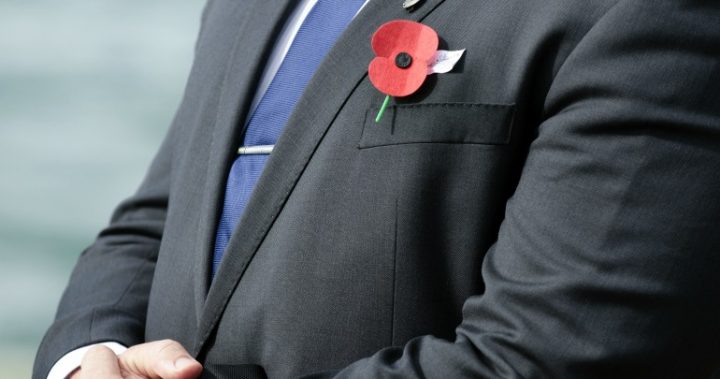Is it disrespectful to not wear a poppy on Remembrance Day?

As Remembrance Day fast approaches for Commonwealth Nations, little red poppies can be spotted pinned to lapels and scarfs, or as symbolic decorations on war memorials. But one man believes that there should be more poppies around—in fact, he believes every single person should be proudly displaying some kind of poppy merchandise on Sunday, November 11.
Simon Weston, a war hero and veteran of the British Army, is a staunch advocate for the Remembrance Day poppy. Weston, who suffered severe burn injuries during the Falklands War in 1982, penned an article for The Sun, in which he called people who shun the poppy “morally bankrupt”.
“People who refuse to wear the red poppy as they believe it glorifies conflict only need to look at my appearance to see that there is nothing glamorous about war,” Weston begins. “They are hijacking a campaign that helps families of the injured and the dead, one that raises funds to look after those who served.
“Young people might choose to believe in something different, but the only reason they have that choice is because of sacrifices made by others—and they must respect that.”
Weston writes at length about the importance of respect, pointing out that if we didn’t have people “willing to make the ultimate sacrifice” then it would be “far too easy for the major aggressors of this planet to win”.
The Falklands hero compares Islamic State to Nazis, and reminds readers that stopping evil at every corner cannot be done with a pen, but with action by those willing to put their lives on the line.
“They must never believe that taking a morally bankrupt stand on what the red poppy is about is correct,” Weston writes.
In addition to respecting and remembering those who sacrificed their lives for the freedom of their countries, Weston reminds readers that buying a red poppy can help to provide “financial, physical, medical and emotional support to those who are unable to do so for themselves”.
Despite being such a symbol of peace and respect, the poppies have been banned by some organisations as well as being boycotted by individuals. FIFA (the Fédération Internationale de Football Association) bans “any political, religious or commercial messages on shirts”, including the red poppy.
In 2016, both Prince William and the UK prime minister David Cameron personally appealed to the organisation to allow players to wear black armbands embroidered with red poppies during an England vs Scotland World Cup qualifier round on November 11, according to The Guardian.
Just last week, the pub chain JD Wetherspoon, which operates in the United Kingdom and the Republic of Ireland, was subjected to public scrutiny after a fake account declared that employees of the chain would not be able to wear the poppy at work.
“Due to the ever expanding multiculturalism of our clientele and employees this year our staff will not be wearing the poppy while working,” [sic] the Twitter post read.
https://twitter.com/Wetherspoon_UK/status/922399845633191938
Those who didn’t recognise the account as a fake were quick to attack JD Wetherspoon even after the account was revealed to be a fake.
“We do support the Poppy Appeal in all of our pubs. Please ignore spoof sites,” the official account tweeted, along with a statement that declared the parody account’s remarks “distasteful and insensitive”.
https://twitter.com/jdwtweet/status/923528998638047233
Do you think it should be mandatory for everyone to wear the poppy on Remembrance Day?








 Proudly Australian owned and operated
Proudly Australian owned and operated